Our country, our lives, and even our civilization are on the brink of destruction. And what are we doing about it?
 Which problem is so dire?
Which problem is so dire?
What is the greatest threat to America? Continue reading

Our country, our lives, and even our civilization are on the brink of destruction. And what are we doing about it?
 Which problem is so dire?
Which problem is so dire?
What is the greatest threat to America? Continue reading

From the Saturday Globe with color cartoons on the immigration issue, Utica, NY, 18 April 1908.
Speaker Mike Johnson (R-La.) pledged Monday to block foreign aid to Ukraine and Israel unless measures including “remain in Mexico” are reinstated in U.S. border policy.
In an appearance on conservative commentator Hugh Hewitt’s radio show , Johnson lamented that aid to Israel and Ukraine amid their respective wars were packaged together in a supplemental budget request by the Biden administration, but the Speaker made clear his priority is border policy.
“Israel and Ukraine are separate and distinct. We have to support Israel. It’s a top priority. Ukraine’s important as well. But we cannot be involved in securing the border of Ukraine or other nations until we secure our own. And so that border fight is coming, and we’re going to die on that hill… (Continue to full article)
House Judiciary Hearing Highlights the Cost of Illegal Immigration to American Taxpayers

In a House Judiciary Subcommittee on Immigration Integrity, Security, and Enforcement hearing on Thursday, a panel of witnesses and Republican lawmakers revealed how Biden’s open border policies have strained American taxpayers and put national security at risk.
In the hearing, Republican Rep. Wesley Hunt (TX) said that the Transportation Security Administration (TSA) has an “entirely different standard” for illegal immigrants boarding flights in the U.S.
“This is a line in the Tucson airport specially made for non-citizens,” Hunt said in his remarks while showing a graphic of the airport.
“The sign says: ‘Non-U.S. citizens without passports enter here.’ Without passports. That is the tip of the iceberg… (Continue to full article)
Maine Builds Rent-Free Apartments for Illegal Migrants Paid for by American Taxpayers
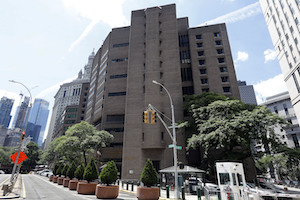 Hardworking Maine taxpayers are footing the bill for the construction of several apartment buildings where illegal migrants will live rent-free.
Hardworking Maine taxpayers are footing the bill for the construction of several apartment buildings where illegal migrants will live rent-free.
… Maine officials celebrated the renovation of a former naval air station base where 60 new apartment units in five buildings will go up. Border crossers and illegal migrants will be able to live rent-free – paid for by hardworking taxpayers – for at least two years while they await work permits.
News Center Maine reported that the goal is to move migrants out of hotels and shelters and into stable housing – despite being in the U.S. illegally and mooching off of American benefits… (Continue to full article)
Leonardo Da Vinci is probably full of envy in heaven, for not having been able to paint Arpi in this beautiful scene!
16K Chinese Migrants Headed for U.S. Border – Detained
 Border Patrol agents apprehended tens of thousands of illegal Chinese migrants headed for the U.S. border as Biden’s immigration crisis continues to threaten the nation’s national security risk.
Border Patrol agents apprehended tens of thousands of illegal Chinese migrants headed for the U.S. border as Biden’s immigration crisis continues to threaten the nation’s national security risk.
Since October 1, 2023, Border Patrol agents have detained nearly 16,000 Chinese nationals who illegally crossed the border between ports of entry. According to U.S. Customs and Border Protection reports, 9,844 migrants were apprehended in October and November, leaving roughly 6,800 to be arrested since December 1, 2023.
In addition, Mexican authorities detained 40 Chinese illegal migrants who were traveling by bus in southern Mexico on their way to the United States. That same day, Mexican authorities apprehended 180 migrants in the state of Oaxaca coming from Central and South America – also heading for the U.S…. (Continue to full article)
 The purchase of $85 million worth of US agricultural land by a Chinese billionaire and alleged Communist Party member has sparked outcry among lawmakers after it went largely unreported for eight years.
The purchase of $85 million worth of US agricultural land by a Chinese billionaire and alleged Communist Party member has sparked outcry among lawmakers after it went largely unreported for eight years.
It emerged earlier this week that California-based online gaming pioneer Chen Tianqiao owns 198,000 acres of Oregon timberland, making him the second largest foreign owner of American land.
The sale went through in 2015, but only became widespread knowledge on Monday after Oregon tax records unveiled one of Chen’s companies as the beneficial owner… (Continue to full article)

Chicago, Chicago, that Toddlin’ Town…
The situation in Chicago is dire, with hundreds of migrants living in buses and resorting to desperate measures like searching through trash bins for food. Over the past 16 months, an estimated 34,000 migrants have arrived in Chicago, overwhelming the city’s shelter system. Initially, police precincts were enlisted to house the migrants, but this temporary solution was discontinued in December. With the city’s 27 designated shelter buildings already at full capacity, authorities have been scrambling to find alternative housing options.
A recent addition of eight “warming buses” in the West Loop aimed to alleviate some of the burden. However, conditions on these buses are far from comfortable, with basic necessities like food and on-site shower facilities being scarce. Volunteers have been providing limited provisions like packets of oatmeal and Nutri-Grain bars, but the situation remains dire. One Venezuelan migrant, Robinson Mendez, shared his experience, stating that without proper food, people are forced to resort to extreme measures.
Mendez recently witnessed a distressing scene involving hungry migrants in Chicago… (Continue to full article)
Border residents to Congress: ‘Stop holding press conferences, shut down the border‘
 As another Republican congressional delegation arrived in Eagle Pass, Texas, Wednesday to hold another news conference and meet local residents, many Texans living at the border say they are fed up and want Congress to shut down the border.
As another Republican congressional delegation arrived in Eagle Pass, Texas, Wednesday to hold another news conference and meet local residents, many Texans living at the border say they are fed up and want Congress to shut down the border.
If Congress continues to use taxpayer dollars to fund policies that facilitate the border crisis, they argue, Congress is complicit in creating it and a national security threat.
Congress hasn’t yet agreed to a $13.6 billion request from the president to fund “border enforcement and migration management.” This includes hiring more judges and asylum staffers “to expedite the screening process” to release more people into the U.S., White House Communications Director Ben LaBolt recently explained. House Republicans have “refused to take up the President’s supplemental funding request. Actions speak louder than words. It’s time for House Republicans to act… (Continue to full article)
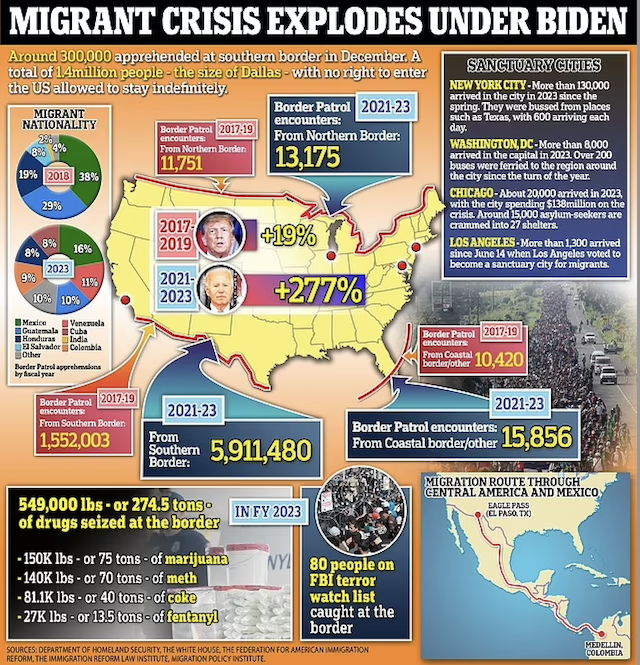
 The border crisis has escalated even further in recent months as more than 300,000 illegal aliens crossed the southern border in December, shattering a new record for monthly border crossings. After setting records for illegal crossings in 2021 and 2022, the Biden Administration’s anti-border policies once again likely facilitated a record number of illegal crossings at the southern border in 2023, although the official numbers for last year have still not been released. Don’t expect the records set in 2023 to last very long either, because 2024 is likely to be an even worse year for border security.
The border crisis has escalated even further in recent months as more than 300,000 illegal aliens crossed the southern border in December, shattering a new record for monthly border crossings. After setting records for illegal crossings in 2021 and 2022, the Biden Administration’s anti-border policies once again likely facilitated a record number of illegal crossings at the southern border in 2023, although the official numbers for last year have still not been released. Don’t expect the records set in 2023 to last very long either, because 2024 is likely to be an even worse year for border security.
The deteriorating situation at the southern border is primarily due to the lack of deterrent facing foreign nationals who cross the border illegally in order to file bogus asylum claims. The current administration is the first in U.S. history to announce publicly that there will be no consequences for those who cross the border illegally. Continue reading
 Immigrants who are choosing to enter the U.S. illegally have to go through the cartels. The Mexican cartels have a monopoly on the various methods of getting into the U.S. through gaps in the border wall. But though the migrants have the freedom to choose to enter the U.S. this way, the cartels are happy to inflict as much misery and extortion as they can and exacerbate the humanitarian crisis created by President Joe Biden’s open border.
Immigrants who are choosing to enter the U.S. illegally have to go through the cartels. The Mexican cartels have a monopoly on the various methods of getting into the U.S. through gaps in the border wall. But though the migrants have the freedom to choose to enter the U.S. this way, the cartels are happy to inflict as much misery and extortion as they can and exacerbate the humanitarian crisis created by President Joe Biden’s open border.
Smuggling illegal immigrants is big business. The House Judiciary Committee published a claim by Border Patrol that the Mexican cartels rake in $32 million a week from illegal immigrants desperate to cross the southern border. Continue reading
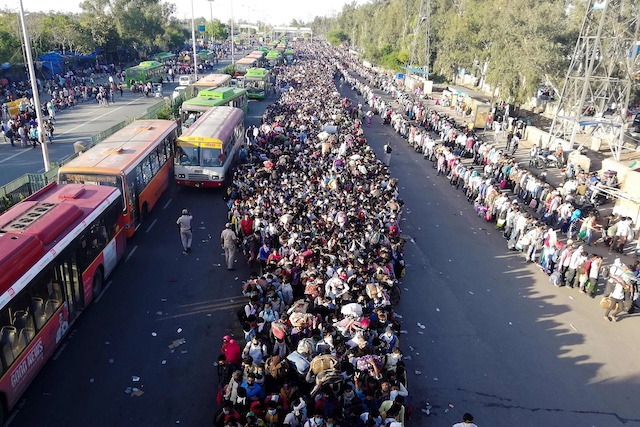 Just saw a report on Fox News this morning where the mayor of New York City just put out an executive order that they don’t want anymore busloads of illegal immigrants dropped off in their fair city. One busload of illegals got dropped off over in New Jersey because of that. It seems that Chicago has got the same problem.
Just saw a report on Fox News this morning where the mayor of New York City just put out an executive order that they don’t want anymore busloads of illegal immigrants dropped off in their fair city. One busload of illegals got dropped off over in New Jersey because of that. It seems that Chicago has got the same problem.
I get a kick out of these big blue cities sending out their virtue signals saying “Hey, those mean old Texans down on the border don’t want you, but we’ll gladly take in your “poor, huddles masses” because we are truly compassionate.” Continue reading

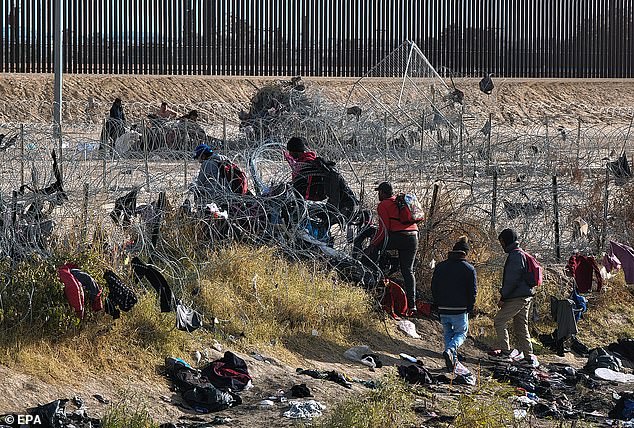
Taxpayers will be forced to fork out $3.1BN PER YEAR in medical care for an extra 700,000 people
On January 1, taxpayers will now be forced to fork out thousands for medical care for an additional 700,000 undocumented immigrants – between 26 and 49 – eligible for full coverage under Medi-Cal, California’s Medicaid program.
It comes as more than a staggering 1.5 million are pouring across the southern border every year many of them seeking shelter in California’s Democrat-run ‘sanctuary cities.’… (Continue to full article)
More than 302,000 illegal migrants crossed into the US in December setting the record for most entries in HISTORY as Biden grapples with the fallout of his administration’s policies
A record number of migrants crossed the U.S. southern border in December, according to a new report, topping the highest amount ever recorded as President Joe Biden continues to grapple with the crisis.
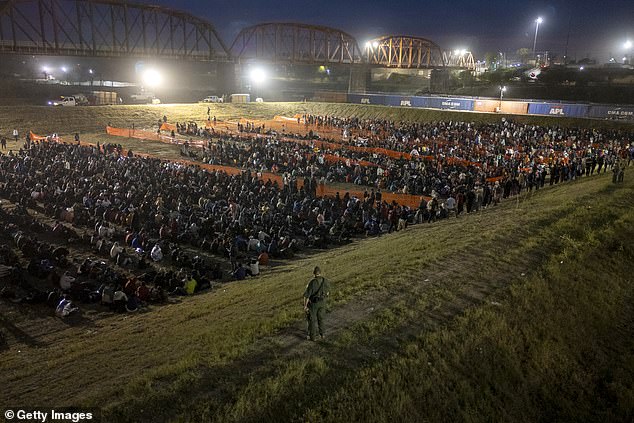
Mucho Migranta!
There were 300,000 encounters in the last month of 2023, U.S. Custom and Border Patrol sources told Fox News. Between Dec. 1 and December 31, more than 302,000 migrants were documented attempting to cross the U.S. southern border.
Biden has asked Congress for $61 billion in aid to Ukraine, but Republicans are refusing to approve the assistance without an agreement with Democrats to tighten security along the U.S.-Mexico border. His request also includes $14 billion for Israel as it fights Hamas and $14 billion for U.S. border security.
Thousands more were set to arrive in the coming days in the form of a massive migrant caravan making its way through Mexico to the southern border… (Continue to full article)
Mexico and Venezuela restart repatriation flights amid pressure to curb soaring migration to U.S.
Mexico and Venezuela announced Saturday that they have restarted repatriation flights of Venezuelans migrants in Mexico, the latest move by countries in the region to take on a flood of people traveling north to the United States.
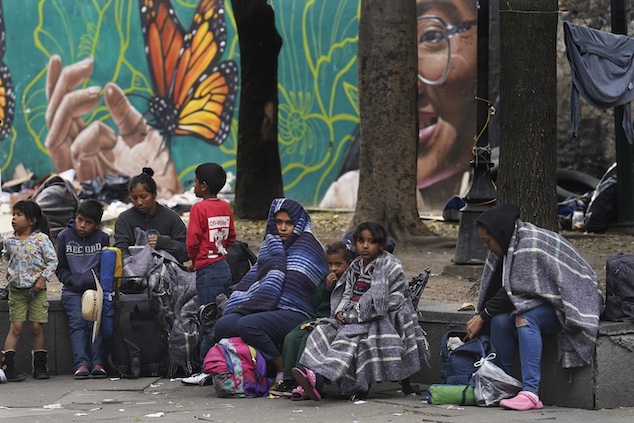 The move comes as authorities say at least 10,000 migrants a day have been arriving at the U.S.-Mexico border, many of them asylum seekers. It also comes as a migrant caravan of thousands of people from across the region – largely Venezuelans – has trekked through southern Mexico this week.
The move comes as authorities say at least 10,000 migrants a day have been arriving at the U.S.-Mexico border, many of them asylum seekers. It also comes as a migrant caravan of thousands of people from across the region – largely Venezuelans – has trekked through southern Mexico this week.
The repatriation flights are part of an agreement made between regional leaders during a summit in Mexico in October that aimed to seek solutions for migration levels that show few signs of slowing down… (Continue to full article)
Top 5 immigration stories of 2023: Driver’s Licenses for All, reunification delays, tragedy in the Somali community
 After years of trying to understand the complexities of the U.S. immigration system and how it impacts Minnesotans, I finally got the chance to really dig deeper into the cracks in the system and its effects on people.
After years of trying to understand the complexities of the U.S. immigration system and how it impacts Minnesotans, I finally got the chance to really dig deeper into the cracks in the system and its effects on people.
In a major victory for immigration advocates this year, the Minnesota Legislature passed Driver’s Licenses For All, a bill that allows undocumented Minnesotans the chance to get a driver’s license. Covering that issue gave me the opportunity to look at how public safety and local law enforcement intersect with the immigration system – advocates often call this intersection “crimmigration.” Much of my year was spent reporting on U.S. Immigration Customs and Enforcement – better known as ICE—to understand how it operates locally.
But immigration issues are just one aspect of the story. I continued to write about the lives of immigrants in Minnesota and the ways communities come together – during times of both celebration and tragedy.
Here’s a breakdown of Sahan Journal’s top stories about immigration in Minnesota in the last year… (Continue to full article)
Immigration Enforcement Legislation, 26 State State Attorneys General Unite for Urgency
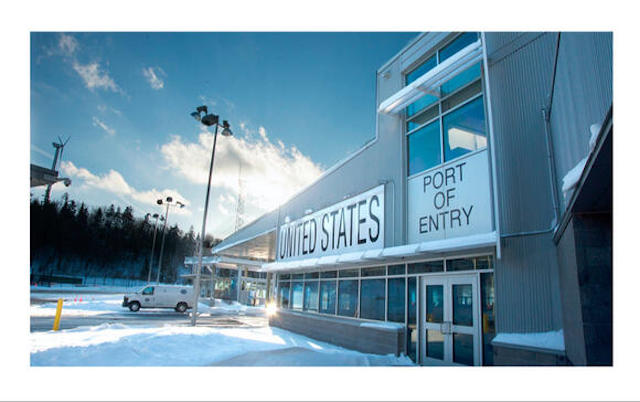 In a unified effort, twenty-six state attorneys general are urgently calling on House Speaker Mike Johnson to expedite the passage of a crucial bill, the Immigration Enforcement Partnership Act, or H.R. 1337. This legislation, introduced by Rep. Bill Posey, R-Fla., on March 3, 2023, empowers state officials to assume the role of federal immigration authorities when the Homeland Security secretary neglects their responsibilities.
In a unified effort, twenty-six state attorneys general are urgently calling on House Speaker Mike Johnson to expedite the passage of a crucial bill, the Immigration Enforcement Partnership Act, or H.R. 1337. This legislation, introduced by Rep. Bill Posey, R-Fla., on March 3, 2023, empowers state officials to assume the role of federal immigration authorities when the Homeland Security secretary neglects their responsibilities.
The appeal, spearheaded by Florida Attorney General Ashley Moody, expresses astonishment at the limited attention given to H.R. 1337 and similar proposals. The attorneys general are urging Speaker Johnson to prioritize these critical issues.
Signatories to the letter, which includes attorneys general from Alabama, Alaska, Missouri, Ohio, Tennessee, and Texas, emphasize the urgent need to address what they describe as “the devastating effects of our wide-open border… (Continue to full article)
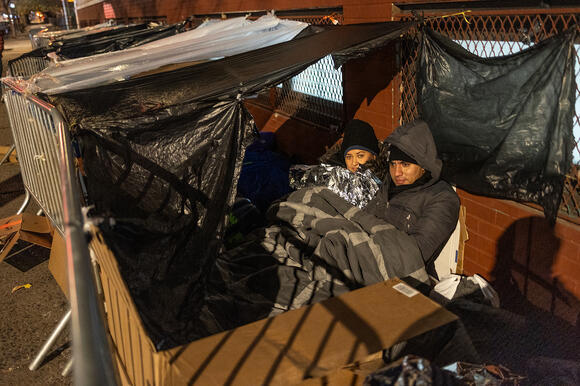
Migrants in a long line overnight hoping to receive a placement in a city shelter, December 6, 2023 in the East Village neighborhood of New York City. Andrew Lichtenstein/Corbis via Getty Images
Migrants in record numbers have signed up for New York City identification cards, a first step in becoming an official resident of the Big Apple, according to a report.
The ID-NYC cards, official photo IDs for New York City residents and available for people regardless of their immigration status, can be used for a variety of services, from applying for health insurance to Section 8 housing. Continue reading
 Joe Biden’s policies have been an unmitigated disaster. Even the lefties know that, but they gaslight us and pretend Joe is another Franklin D. Roosevelt.
Joe Biden’s policies have been an unmitigated disaster. Even the lefties know that, but they gaslight us and pretend Joe is another Franklin D. Roosevelt.
One thing they can’t gaslight us about is the open border on the south. So far, 8,000,000 people have poured in during Biden’s watch. Even Marxist mayors in Chicago and New York are starting to complain. The ’sanctuary cites’ are now saturated cities. They don’t know what to do about it and they’re starting to blame the Biden Administration. Continue reading
 Annual southwest border apprehensions exceeded 405,500 just once during the last presidency, in fiscal year 2019, when they hit 860,000. Trump responded with the successful “Remain in Mexico” program, driving illegal migration down again. Continue reading
Annual southwest border apprehensions exceeded 405,500 just once during the last presidency, in fiscal year 2019, when they hit 860,000. Trump responded with the successful “Remain in Mexico” program, driving illegal migration down again. Continue reading
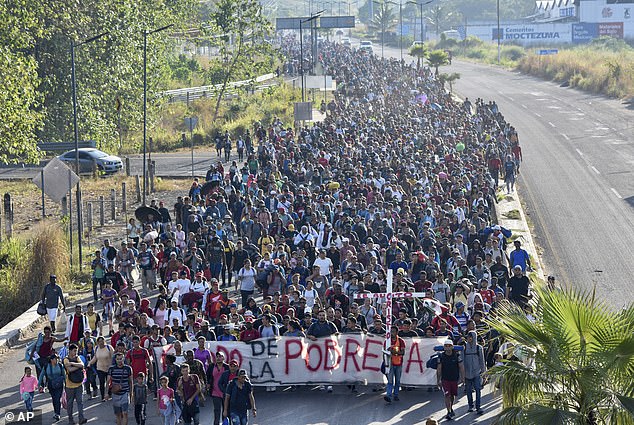 The biggest migrant caravan for 18 months set off for the US from Mexico on Christmas Eve as border crossing records continue to tumble.
The biggest migrant caravan for 18 months set off for the US from Mexico on Christmas Eve as border crossing records continue to tumble.
Around 10,000 people led by Mexican activist Luis Rey Garcia Villagran left the southern Mexican border town of Tapachula for the long march north as more of those already at the US border finished their journey this evening.
Biden has hauled Secretary of State Anthony Blinken away from the crisis in the Middle East for a summit with Mexican president Andrés Manuel López Obrador on Wednesday, after US authorities recorded more than 242,000 migrants crossing in November alone. (Continue to full article)
NO Border Patrol agents are patrolling large areas of border as 14,000 migrants enter city in a single day and agents are reassigned to guard them
In the last week, the number of migrants illegally entering the US through Eagle Pass and then claiming asylum – which legally forces the Border Patrol to give them paperwork allowing them to stay in the US while their asylum case is heard – has been climbing.
But starting Monday, the numbers exploded.
In the last 24 hours, 14,000 migrants rushed the popular migrant crossing spot that is home to just 30,000 Texans.
‘Christmas Day will be WORSE. President Biden has abandoned border communities … (Continue to full article)
TUCSON, Ariz. – Border security and stability are on the front door of southern Arizona ranchers who are being warned about cartel fighting on the other side.
One rancher described the gunbattle south of Arivaca on Wednesday that ended when the Mexican military showed up.
She said Border Patrol keeps her informed about situations like this and keeps people from running onto her property.
But she is watching for elected officials to come up with a plan to not just protect her but to address the thousands of migrants showing up each day, with some of them asking her for help. Continue reading
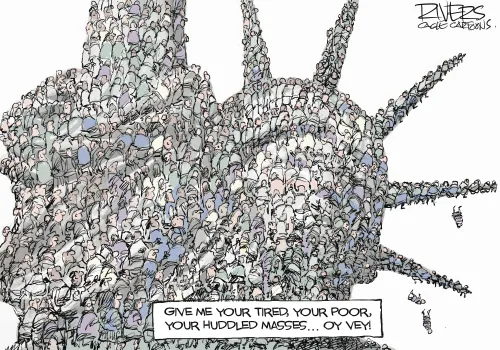 We’ve got Israel looking for billions.
We’ve got Israel looking for billions.
We’ve got Ukraine begging for more billions.
And the president and Democrats can’t wait another day to cut fat checks for both countries. Continue reading
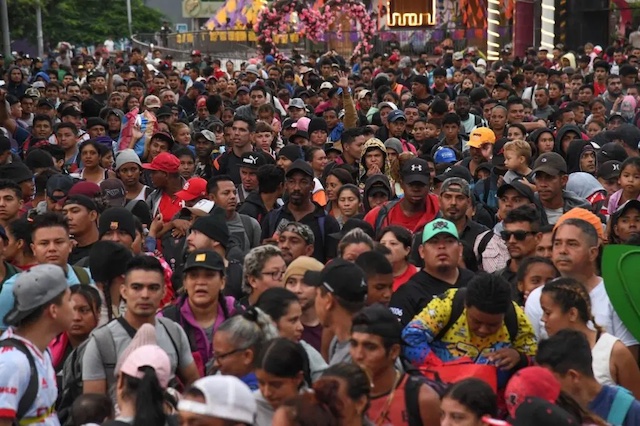
Migrants take part in a caravan towards the border with the United States in Tapachula, Chiapas State, Mexico, on October 30, 2023
As a physician, I tend to view the burgeoning migrant border crisis as much as a public health emergency as it is a national security emergency. The distinction is becoming more and more blurred, since the 2 million or more migrants who have crossed our southern border illegally over the past year — many supposedly seeking asylum — present both problems.
Don’t get me wrong: Many of the millions who have escaped Venezuela or Central America for economic and political reasons certainly have legitimate causes to leave their countries. But we don’t have the public health infrastructure here to absorb them all, not to mention the burdens on our local and state economies. At the same time, deadly fentanyl is pouring across our porous border, posing a huge medical risk of overdoses all across the country.
From a public health point of view, we are hardly prepared to handle such huge numbers of migrants, many of whom have chronic health issues or other acute problems… (Continue to full article)
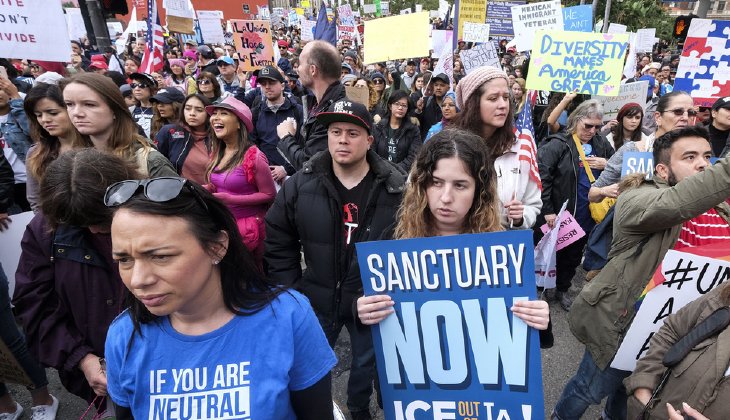 Even though Americans support immigration, they have been willing to accept tougher prescriptions for enforcement — and their willingness could test how far hard-liners can go in 2024 with anti-immigrant proposals.
Even though Americans support immigration, they have been willing to accept tougher prescriptions for enforcement — and their willingness could test how far hard-liners can go in 2024 with anti-immigrant proposals.
Democrats, like Republicans, have been joining the drumbeat that there is a “crisis” at the border as the numbers of people the Border Patrol says it encounters hit record levels.
Amid all this, former President Donald Trump promises to expand on the hard-line immigration policies of his first term, setting off alarm bells among immigration advocates and even some Republican conservatives.
Meanwhile, leaders in blue cities that have long welcomed immigrants complain of stretched resources with the influx of newcomers shuttled from Texas and other states. Dividing lines are emerging as immigrants who have worked for years without legal status see newly arrived asylum-seekers from countries like Venezuela get work permits.
Any “show me your papers” policies or Operation Wetback-like roundups could easily ensnare Latino Americans… (Continue to full article)
 States spent tens of millions of taxpayer dollars to ship migrants elsewhere this year.
States spent tens of millions of taxpayer dollars to ship migrants elsewhere this year.
What started as a GOP political stunt ahead of the midterms has led states and cities of both parties to spend significant resources to help migrants and asylum seekers reach other parts of the country.
The U.S. has a resettlement process for refugees that ensures they are placed in communities prepared to support them, but there is no such national coordination for migrants and asylum seekers.
Responding to historic levels of migration throughout the Americas has come with high costs across the board in the U.S.
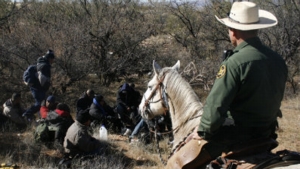
Arizona Border Patrol
Border Patrol leadership in the Tucson region of Arizona is calling for “all hands on deck” to respond to an “unprecedented surge” of illegal immigrants , the Washington Examiner has learned.
Federal law enforcement agents in southeastern Arizona sounded the alarm in conversations with the Washington Examiner on Monday, disclosing that agents have been pulled from manning the highway checkpoints, canceled all training classes, and even diverted from desk jobs, such as posting updates on the organization’s local social media, a sign of how strained the agency has become responding to thousands crossing in just one part of the southern border each day.
“As you are aware, Tucson Sector is experiencing an unprecedented surge of illegal entries in our [area of responsibility],” Tucson leadership wrote in an email to agents this afternoon, according to a copy obtained by the Washington Examiner on Monday. “[T]his morning we had more than 5,000 people in custody – far more than our holding capacity.”… (Continue to full article)
 The sheer magnitude of incompetence and corruption in Washington DC makes this journalist sick to my stomach weekly. It’s almost beyond comprehension of what’s going on with those 535 Congressional Critters. What are they doing and why are they screwing up/destroying our country to this degree in 2023?
The sheer magnitude of incompetence and corruption in Washington DC makes this journalist sick to my stomach weekly. It’s almost beyond comprehension of what’s going on with those 535 Congressional Critters. What are they doing and why are they screwing up/destroying our country to this degree in 2023?
Not to mention, we endure our president of the United States who shakes hands with the air, must be led off stage by his wife, who doesn’t know where he is or what day of the week it is, let alone the location of Israel on a map. He doesn’t write his speeches. He can’t remember what he’s talking about as he mumbles along with the aid of a teleprompter. Whomever writes his speeches is the one running our country. Continue reading
 The Biden/Obama Regime recently sent 800 troops to the border. Why? So They can speed up the paperwork in letting illegal immigrants into the country, that’s why. They won’t be allowed to do anything that will hinder those illegals from getting in. We’ve already lost the border to the illegals and the cartels so all these troops will be allowed to do is facilitate the paperwork that will allow them to stay here. They will be allowed to do nothing to keep the illegals out because the Biden/Obama Regime wants as many as possible here for next year for the 2024 election. The regime plans to turn Texas into a blue state if they can give the illegals the ability to vote next year. Continue reading
The Biden/Obama Regime recently sent 800 troops to the border. Why? So They can speed up the paperwork in letting illegal immigrants into the country, that’s why. They won’t be allowed to do anything that will hinder those illegals from getting in. We’ve already lost the border to the illegals and the cartels so all these troops will be allowed to do is facilitate the paperwork that will allow them to stay here. They will be allowed to do nothing to keep the illegals out because the Biden/Obama Regime wants as many as possible here for next year for the 2024 election. The regime plans to turn Texas into a blue state if they can give the illegals the ability to vote next year. Continue reading
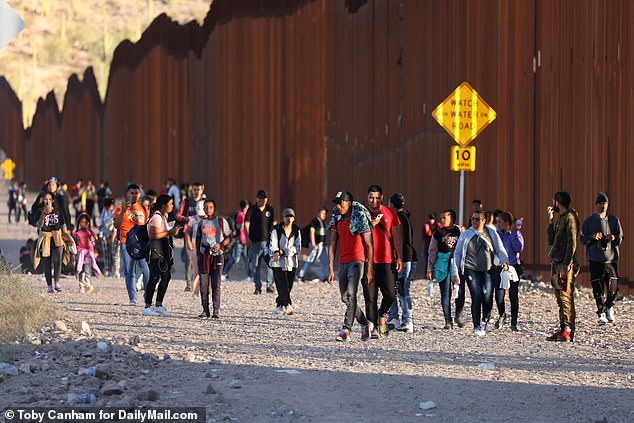
550 people crossing into Arizona in little more than an hour on Thursday evening in just one small patch of the border with Mexico
First comes the phone, thrust through the steel bars and twisted one way and then the other as its camera scans for Border Patrol officers.
Then comes the clanging, as the bars — already cut with an acetylene torch — are forced apart.
Only then come the people. Man, woman, child, woman, child, child, man, man, woman.
Eight bodies emerge on to American soil beside Donald Trump’s border wall in Arizona. They bear right, armed with instructions on how to find Border Patrol officers and hand themselves in. Continue reading
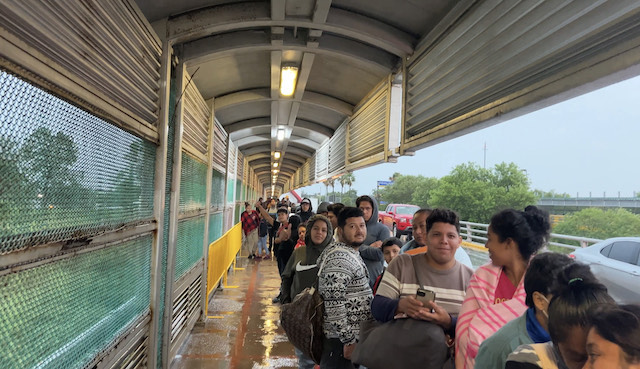
CBP One appointment recipients wait in long lines on the Matamoros, Mexico, side of an international bridge waiting to be called in by CBP officers on the Brownsville, Texas, side. May 2023 photo by Todd Bensman.
In January 2023, the Biden Administration announced what has become the cornerstone of its “new lawful pathways” strategy to manage the historic volumes of foreign nationals illegally crossing the U.S Southwest border.
The White House announcement explained that inadmissible aliens from four of the most numerous nationalities crossing illegally – Venezuelans, Nicaraguans, Haitians, and Cubans – would be able to use the “CBP One” mobile phone app to schedule an appointment with U.S. Customs and Border Protection (CBP) officers, in order to be escorted through a port of entry (POE) and quickly granted temporary “humanitarian parole” and released into the country. Continue reading
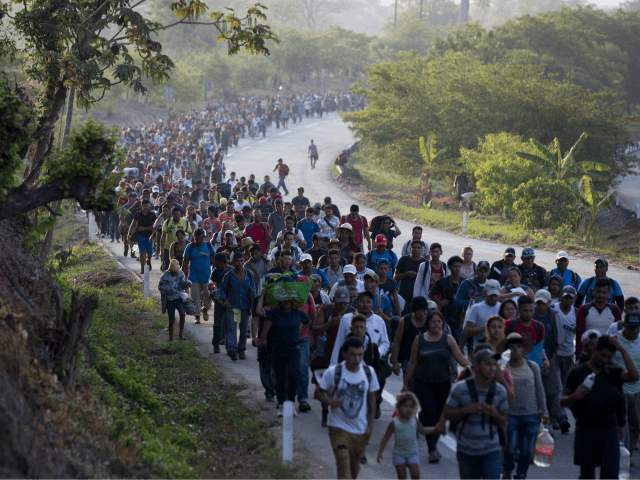 On October 10, the majority Republicans on the House Judiciary Committee released a blockbuster report captioned “The Biden Border Crisis: New Data and Testimony Show How the Biden Administration Opened the Southwest Border and Abandoned Interior Enforcement”. It reveals how the administration has broken our immigration system, with one phrase therein ringing truest: “There is virtually no enforcement of our immigration laws.” Continue reading
On October 10, the majority Republicans on the House Judiciary Committee released a blockbuster report captioned “The Biden Border Crisis: New Data and Testimony Show How the Biden Administration Opened the Southwest Border and Abandoned Interior Enforcement”. It reveals how the administration has broken our immigration system, with one phrase therein ringing truest: “There is virtually no enforcement of our immigration laws.” Continue reading
 ~ Summary ~
~ Summary ~* The Trump campaign has called for the invocation of the “Alien Enemies Act” (“AEA”) to “remove all known or suspected gang Members, drug dealers, or Cartel Members from the U.S.”
* The AEA was enacted in 1798 in reaction to a feared invasion by France, then in the throws of the infamous French Revolution. The Justice Department has explained that “One of the measures of protection found by every nation to be most necessary in time of war is the guarding against internal enemies whose operations are more insidious, and therefore, more dangerous … in many cases, than are the active maneuvers of military forces … . An army of spies, incendiaries, and propagandists may be more dangerous than an army of soldiers.”
* Unlike the other “Alien and Sedition Acts” of 1798, the AEA received wide bipartisan support, including that of Thomas Jefferson and James Madison, implacable opponents of the other Acts.
* The AEA is still good law, providing that “Whenever there is a declared war between the United States and any foreign nation or government, or any invasion or predatory incursion is perpetrated, attempted, or threatened against the territory of the United States by any foreign nation or government … all natives, citizens, denizens, or subjects of the hostile nation or government [at least 14 years old and not having become naturalized U.S. citizens] … shall be liable to be apprehended, restrained, secured, and removed as alien enemies.” Continue reading